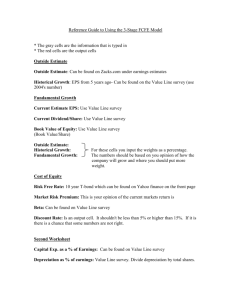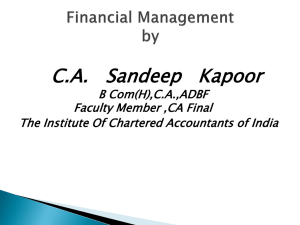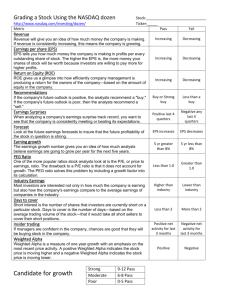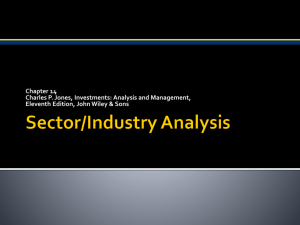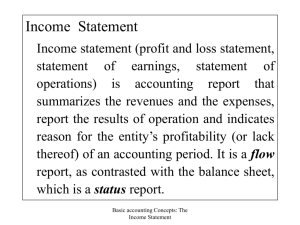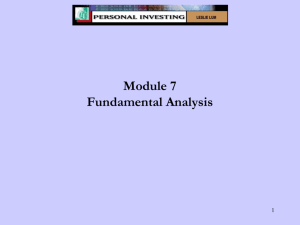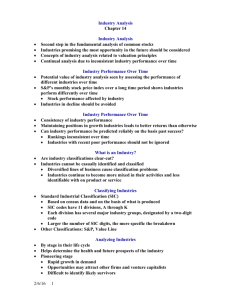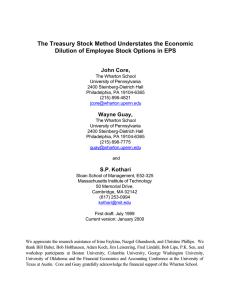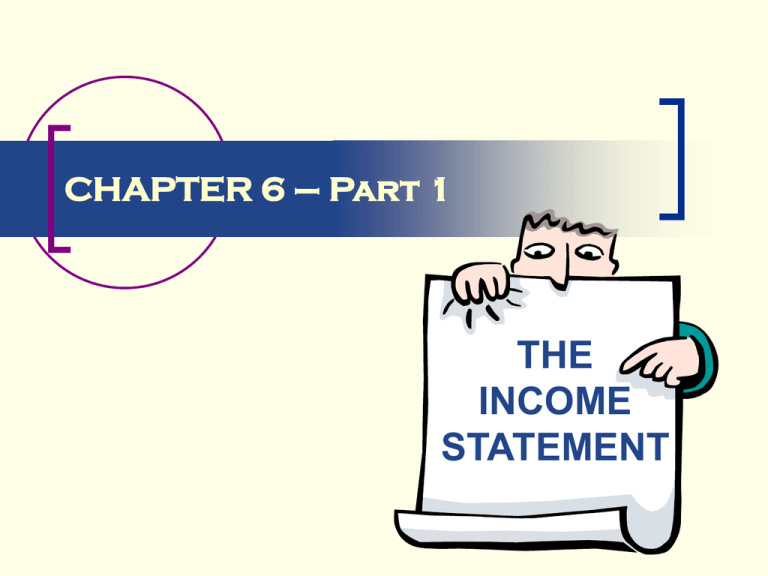
CHAPTER 6 – Part 1
THE
INCOME
STATEMENT
Introduction
Various groups are affected by, and have a stake in, the
financial reporting requirements of the FASB and the SEC
Introduction
Investors in equity securities are the central focus of
the financial reporting environment
Introduction
Investing involves
giving up current resources
for future uncertain resources.
Therefore, investors require information
assessing future cash flows.
The Economic Consequences
of Financial Reporting
Financial reporting has economic consequences
including:
1
Financial information can affect the distribution of wealth among
investors.
More informed investors, or investors employing security analysts, may
be able to increase their wealth at the expense of less informed investors.
The Economic Consequences of
Financial Reporting
2
Financial information can affect the level of risk
accepted by a firm.
3
Focusing on short-term, less risky, projects may have
long-term detrimental effects.
Financial information
can affect the rate of capital formation in the economy
and result in a reallocation of wealth between consumption and
investment within the economy.
The Economic Consequences
of Financial Reporting
4
Financial information can affect how investment is allocated among
firms.
These economic consequences may have a differential impact on
different user groups and future deliberations of standards must
consider these economic consequences
Elements of the Income Statement
SFAC No. 1 indicates that the primary
focus of financial reporting is to
provide information about a
company’s performance
The income statement reports on performance
and the elements of the income statement were
defined in SFAC No. 6 as:
Revenues
Gains
Expenses
Losses
Each Term Is Defined As Changes in
Assets and Liabilities
Differences between changes in assets approach and
inflow and outflow definition are:
1.
2.
Change in net economic
resources
Measure of
effectiveness
Definition of Assets and Liabilities
Earnings
3.
VS
Creation of deferred
charges when measuring
income
VS
VS
Revenue & Expenses
Recognition when they
are economic resources
or obligations
Each Term Is Defined As Changes in
Assets and Liabilities
4.
5.
Both agree on importance of income statement
The change in asset
approach limits the
population from which
elements can be selected
to net economic
resources.
VS
The flows method
includes items
necessary to match
Statement Format
The preparation of the income
statement has been impacted by
differences of opinion on the
definition of ongoing operations.
Two views:
1 All inclusive
2 Current operating performance
Current Income Statement
Format
Proscribed in APB Opinion No. 9 as:
Revenues
Less: Cost of goods sold
= Gross profit
Less: Administrative and selling expenses
Plus: Other gains
Less: Other losses
= Income from continuing operations
Discontinued operations
Extraordinary items
Change in accounting principle
= Net income
Income From Continuing
Operations
Normal and recurring revenues and expenses
Sustainable income
Income tax
Nonrecurring items
Discontinued operations
Extraordinary items
Change in accounting principle
Best Buy and Circuit City
Best Buy Co., Inc. is a specialty retailer of
consumer electronics, home office
equipment, entertainment software and
appliances.
Circuit City Stores, Inc. is a national retailer of
brand name consumer electronics, personal
computers and entertainment software.
We will use information from the two companies’
fiscal 2003 annual reports to illustrate the
disclosure of information in this and subsequent
chapters.
Discontinued Operations
Why special treatment?
Arise from a disposal of a segment of a business
Comprised of two elements
Gain or loss on disposed assets
Gain or loss on operations during the disposal periods
When to report
Measurement date
Disposal date
Circuit City previously owned the CarMax auto superstore,
but it was spun off from on October 1, 2002
Extraordinary Items
Original definition
Problems
APB No. Opinion No. 30
Unusual nature
Infrequency of occurrence
Problem:
Requirements do not always separate recurring and nonrecurring items
As a result, there is a tendency to increase the variability of
operating income and decrease the predictive ability of
earnings
The events of 9/11
Neither company discloses any extraordinary items for
the years presented
Accounting Changes
The accounting standard of consistency requires
that similar transactions should be reported
similarly each year
Occasionally an entity may find that reporting needs
are better served by changing a method of accounting
If so, the comparability of financial statements is
impaired
Basic question: Should previously issued
financial statements be amended?
Types of Accounting Changes
Change in accounting principle
How reported
Best Buy changed its method of accounting for goodwill
(discussed in Chapter 10) and vendor allowances in fiscal 2003
Change in accounting
estimate
How reported
Change in accounting entity
How reported
Error
How reported
Earnings Per Share
Basic calculation
Net income - Preferred dividends
Average # of common shares outstanding
APB No. 15
Simple vs. complex capital structure
Required calculation of primary and fully
diluted earnings per share
Criticism of APB No. 15
The FASB and IASC project
SFAS No. 128
Reasons for the change
1
Basic EPS and diluted EPS data would give users the most factually
range of possibilities
2
Use of a common international method is important due to the data
based oriented financial analysis and internationalization of business
3
The notion of common stock equivalents does not operate efficiently
in practice
4
The computation of primary EPS is complex and not well understood
or consistently applied
5
Presenting basic EPS eliminates criticism about the arbitrary nature of
the determination of common stock equivalents
SFAS No. 128
Requires presentation of EPS by all publicly
traded companies issuing common stock
Companies with a simple capital structure will
only report basic earnings per share. All others
will report basic and diluted
Calculation of basic EPS
Net income - Preferred dividends
Average # of common shares outstanding
Diluted Earnings Per Share
Objective
Historical - basic
Pro forma - diluted
Calculation:
Includes all potential dilutive securities
1 Options and warrants - treasury stock method
2 Convertible securities
3 Continently issuable securities
Usefulness of EPS
Objectives of EPS reporting are to provide investors an
indication of :
1
Value of the firm
2
Expected future dividends
Question: Historical or forecasted?
Summary indicator
Both Best Buy and Circuit City have complex capital
structure
disclose basic as well as diluted earnings per share on their
their fiscal 2003 income statements
SFAC No. 5 - Recognition and
Measurement
Comprehensive income definition:
The change in net assets of an entity from
non-owner transactions
Attempts to combine Hicksian capital
maintenance approach with traditional accounting
transactions approach
SFAC No. 5 - Recognition and
Measurement
A full set of financial statements shall show:
Comprehensive
income
Earnings
Investments
by and
distributions
to owners
SFAS No. 5 - Recognition and
Measurement
Comprehensive income
Revenues
Less: Expenses
adjustments
Plus: Gains
Less: Losses
= Earnings
Earnings
Plus or minus cumulative accounting
Plus or minus other nonowner
changes in equity
= Comprehensive income
Measurement Issues
Definitions.
The item meets the definition of an element contained
in SFAC No. 6.
Measurability.
It has a relevant attribute, measurable with sufficient
reliability.
Relevance.
The information about the item is capable of making a
difference in user decisions.
Reliability.
The information is representationally faithful, verifiable,
and neutral.
SFAS No 130 - Reporting
Comprehensive Income
Reasons for the initial
project
1 Off-balance sheet financing
2 The practice of reporting some
items of comprehensive income
in stockholders’ equity
3 Acknowledged need for
harmonization of accounting
standards
Definitions
Comprehensive income
the change in equity (net assets) of a business
enterprise during a period from transactions
and other events and circumstances from
nonowner sources.
Other comprehensive income
revenues, expenses, gains, and losses
included in comprehensive income but
excluded from net income.
Prepared by
Richard Schroeder, PhD
Kathryn Yarbrough, MBA
Copyright © 2005 John Wiley & Sons, Inc. All rights reserved.
Reproduction or translation of this work beyond that permitted in
Section 117 of the 1976 United States Copyright Act without the
express written consent of the copyright owner is unlawful. Request
for further information should be addressed to the Permissions
Department, John Wiley & Sons, Inc. The purchaser may make backup copies for his/her own use only and not for distribution or
resale. The Publisher assumes no responsibility for errors,
omissions, or damages, caused by the use of these programs or from
the use of the information contained herein.

